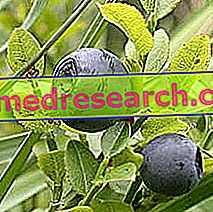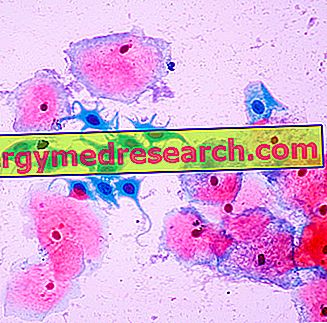
Scientific name
Vaccinium myrtillus
Family
Ericaceae
Origin
Europe
Used Parts
Drug consisting of leaves and fruits (Official Pharmacopoeia)
Chemical constituents
The chemical constituents of blueberry leaves are:
- Tannins;
- Flavonoids;
- Monoterpenic iridoids;
- Phenolic acids;
- Caffeic acid derivatives;
- Alkaloids.
The main chemical constituents of blueberry fruits, however, are:
- Tannins;
- Fruit acids (malic and citric);
- anthocyanosides;
- Flavonoids;
- iridoids;
- Caffeic acid derivatives;
- Pectin.
Blueberry in Herbalist: Property of Blueberry
Blueberry fruits are used as food, in gastronomy and in the liqueur industry.
In addition, different properties are attributed to the blueberry, such as: astringent, antioxidant, vasoprotective, hypolipidemizing, hypoglycemic, platelet anti-aggregation, antiseptic and antiviral.
Not surprisingly, therefore, blueberry fruit extracts are still present in many medicinal specialties.
Biological activity
As mentioned, the great variety of properties is attributed to the blueberry - more specifically, to the extracts obtained from its leaves and its fruits.
Many of these properties have been confirmed by various studies conducted on the subject, but despite this, the use of the plant has obtained official approval only for the treatment of diarrhea and inflammation of the oropharyngeal cavity, thanks to the astringent, anti-inflammatory and antiseptic action of which it is endowed.
The blueberry, however, has also been shown to exert a protective action on the endothelium of arterial vessels and capillaries from the damage of smoking, diabetes and hypertension. More specifically, this activity is carried out by the anthocyanosides contained in the blueberry fruits, molecules to which, among other things, most of the properties attributed to the blueberry are ascribed. In fact, anthocyanosides also reduce platelet aggregation induced by ADP, collagen, PAF and arachidonic acid; they have a strong antioxidant activity; they protect the gastric mucosa from inflammatory or irritative stimuli and have beneficial effects on vision.
In this regard, several studies have been conducted to investigate the action that anthocyanosides have on vision and it has emerged that these molecules not only improve night vision, but are also capable of generating improvements in the sight of cataract patients or from diabetic retinopathy.
The extracts of blueberry leaves, on the other hand, in studies conducted on animals, showed hypolipidemizing and hypoglycemic properties; while in vitro they have shown antibacterial activity against different types of microorganisms, including Staphylococcus aureus and Escherichia coli strains.
Blueberry against diarrhea
Thanks to the astringent properties exercised by the tannins contained in the leaves and blueberry fruits, this plant can be used as a remedy to counteract diarrhea, in particular, in the case of mild enteritis.
As an indication, for the treatment of this disorder, if the blueberry is taken in the form of capsules (standardized to 36% in anthocyanosides), we recommend taking about 60-160 mg of the product three times a day.
Blueberry against inflammation of the oropharyngeal cavity
Thanks to the anti-inflammatory, antioxidant and antiseptic action possessed by bilberry, this plant can be used to treat mild inflammation of the oropharyngeal cavity.
To treat these disorders, the blueberry is used externally. Generally, it is recommended to make rinses with a 10% decoction made from crushed blueberry fruits.
Blueberry in folk medicine and homeopathy
Blueberry leaves are used internally in traditional medicine for the treatment of various disorders, such as gastrointestinal, renal and urinary tract diseases, arthritis, gout and dermatitis. Externally, however, blueberry leaves are used to treat inflammation of the oral mucosa, ocular inflammation, skin disorders and burns.
Blueberry fruits are also exploited by folk medicine, where they are used internally as a remedy to improve eyesight and to fight vomiting and hemorrhoids. Externally, however, blueberry fruits are used in traditional medicine as a remedy to promote the healing of wounds and skin ulcers.
Blueberry is also used in homeopathic medicine, where it can be found in the form of mother tincture, granules and oral drops. In this context, the plant is used as a remedy for diarrhea, colitis, gastroenteritis of viral origin, hemorrhoids, cystitis and varicose veins.
The dose of homeopathic remedy to be taken can be different between one individual and another, also depending on the type of disorder to be treated and the type of homeopathic preparation and dilution that is to be used.
Side effects
Following the intake of blueberry, undesirable effects may occur in the skin, nervous system and gastrointestinal tract (such as digestive disorders and nausea, due to the tannin content).
Furthermore, the use of blueberry at very high doses and for long periods of time can lead to chronic intoxication.
Contraindications
Avoid taking blueberry in case of proven hypersensitivity to one or more components.
Furthermore, the use of blueberry is contraindicated during pregnancy and lactation.
Pharmacological Interactions
Bilberry can establish drug interactions with drugs such as:
- Anticoagulants, low molecular weight heparins, platelet etrombolytic antiplatelet agents (fruits), as an increased risk of bleeding may occur.
- Oral anti-diabetics (leaves).
- Iron salts (leaves).
Bilberry can establish drug interactions with drugs such as:
- Anticoagulants, low molecular weight heparins, antiplatelet agents and thrombolytics (fruits), as an increased risk of bleeding may occur.
- Oral anti-diabetics (leaves).
- Iron salts (leaves).
Warnings
The leaves of the blueberry are found in the negative list of the German Commission, and moreover they expose to the risk of poisoning (anemia, jaundice and cachexia), therefore their use for curative purpose is today abandoned.
Blueberry - Notes
American blueberry juice can be used to prevent recurrent cystitis, but should not be associated with platelet aggregation or anticoagulants.



